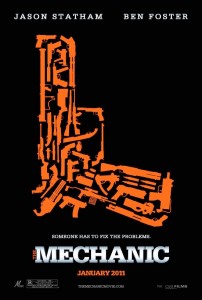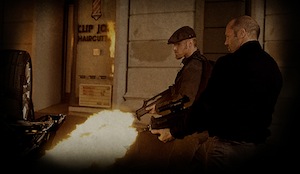 The Mechanic is not the type of film that would typically suffer from inflated-expectations or cynicism from its audience- most anybody who would see a Jason Statham hit-man movie in January is likely to have low expectations married to high hopes, which may well be the most ideal mindset for any film’s audience to have. It’s a mindset that serves something like Faster well, because solid filmmaking and a dash of interesting technique go a long way when you’re expecting little. But a movie of this kind can fail in one of two ways: it can be so definitively bad that it has no value as a genre entry or even an ironically appreciable piece of trash, or it can demonstrate very real potential and then neglect it completely. As you might have guessed, The Mechanic lands squarely in the the second camp and delivers a solid film that could have been much, much better.
The Mechanic is not the type of film that would typically suffer from inflated-expectations or cynicism from its audience- most anybody who would see a Jason Statham hit-man movie in January is likely to have low expectations married to high hopes, which may well be the most ideal mindset for any film’s audience to have. It’s a mindset that serves something like Faster well, because solid filmmaking and a dash of interesting technique go a long way when you’re expecting little. But a movie of this kind can fail in one of two ways: it can be so definitively bad that it has no value as a genre entry or even an ironically appreciable piece of trash, or it can demonstrate very real potential and then neglect it completely. As you might have guessed, The Mechanic lands squarely in the the second camp and delivers a solid film that could have been much, much better.
A remake of the 1972 Charlie Bronson flick of the same name, Simon West’s film is exceedingly modern and slick while appropriating the plot of the original pretty thoroughly. An especially efficient hit-man, Arthur, who works for a shadowy assassination brokerage company is ordered to kill the man who typically assigns him. He does so, but when the man’s son is left with nothing but a dead father, debt, and a self-destructive desire for vengeance, the “Mechanic” takes him in as an apprentice. The two form a deadly partnership that is soon aimed back at the head of the company when it becomes clear that our hero killed one of the few men he had any connection with as part of a choreographed farce. Naturally further lies and betrayal eventually surface and the motives of the partnership quickly shift.
It’s all pretty standard stuff, mounting the last-job/revenge assassin narrative engine to a heist film chassis which gives everyone clear motivations, and lets exposition and job-planning entertainingly fill up much of the runtime. A fairly tight first act gives way to an increasingly messy and careless narrative though. It all starts to unravel when the basic plot conceit of Statham’s ultra private hit-man taking an impulsive young man under his wing is so thinly justified. We’re shown a man who is so concerned with privacy that he lives in the swamp and accesses his home by boat, and whose only human contact is a local woman that he maintains a pretty strict whore/john relationship with. This pays off with a spectacularly gratuitous sex scene (actress Mini Andren is exceedingly naked for a significant chunk of her screentime), but it sets up a distinct character trait that is quickly betrayed.
 So why does Arthur accept the recently fatherless Steve (played by the ever-damaged-goods Ben Foster) into his life? Is it loneliness? We are given a subtle cue that he’s hungry for human contact when his fuck-buddy asks for his name and he tells her the truth (she doesn’t believe him), but the film never pays off the friendship in any way. Is it guilt for murdering the kid’s father, not to mention his own pseudo best friend? That seems to be the key justification, but considering how coldly he wacked the guy in the first place, and some of the events at the tail of the film, the guilt thing doesn’t add up. There’s certainly nothing to indicate that taking down the corporate head is beyond the Mechanic’s skill, or that Steve possesses any great murderous talent. This may tug at your brain for a few seconds as a training montage shamelessly kicks in and the two become a partnership, but… well, whatever.
So why does Arthur accept the recently fatherless Steve (played by the ever-damaged-goods Ben Foster) into his life? Is it loneliness? We are given a subtle cue that he’s hungry for human contact when his fuck-buddy asks for his name and he tells her the truth (she doesn’t believe him), but the film never pays off the friendship in any way. Is it guilt for murdering the kid’s father, not to mention his own pseudo best friend? That seems to be the key justification, but considering how coldly he wacked the guy in the first place, and some of the events at the tail of the film, the guilt thing doesn’t add up. There’s certainly nothing to indicate that taking down the corporate head is beyond the Mechanic’s skill, or that Steve possesses any great murderous talent. This may tug at your brain for a few seconds as a training montage shamelessly kicks in and the two become a partnership, but… well, whatever.
The film picks up the pace for a while at this point, as we see Foster’s character try out a hit and end up in a bizarre homo-erotic charade that turns into a truly brutal David vs. Goliath brawl. It’s the only especially memorable sequence in this sea of aggressive competence, and the only place Foster gets to even begin engaging his considerable talents. This isn’t to say this is the only thing to enjoy about the film- it’s filled with well-done action that is exhilarating enough, even if you’re not likely to leave with any of it replaying in your head. Most of the supporting roles are well filled, with Donald Sutherland in particular bringing class to his brief screentime. The assassinations are interesting with varied targets, and there is enough of a tongue-in-cheek sense of sarcasm about everything that the film never gets bogged down with too much serious-face. Overall the film works, but you consider what a little bit more time spent on some kind of genuine friendship between the socially-hungry Arthur and wayward Steve could have meant, or how much stronger the film would have been if it had really sold a need for this partnership, and you just have to shrug.
The film ultimately settles with being a star-centered B-Action movie though, and right man was chosen to lead it. Jason Statham has become the sort of action icon whose career serves as something of a long-form serial- a collection of films in which the performer has “modes” rather than “characters.” This isn’t to say he’s not acting in the conventional sense of the word, but stoicism is part of the overarching “character” of Jason Statham, much as it was for Eastwood and Wayne in the westerns that casted the mold for the action-hero icon of the 80s through now. Clever line delivery, physical performance, and general charisma are what we demand from these gentleman on screen, and it allows them to do what they do best and sets the stage for later accolades when they stray away from that pattern. All of this to say: Statham is Statham. This is a good thing.
 So you’re aware, I’ve not seen the original film. While I often re-watch originals I’ve already seen when remakes and adaptations are announced, I tend to avoid them if I haven’t so I can see how well they function as stand-alones. The story of The Mechanic is simple, cohesive, and covers all of its bases, but I can’t help but imagine the Bronson film did so in a much more graceful manner. I do know that the original film does not share the same Hollywood bullshit ending that the new film settles with. Franchising concerns and the shallow instinct to default back to cool-as-a-cucumber badassery means any thematically satisfying ending is tossed out the window. The conclusion they chose instead relies on tension and drama that falls completely flaccid the moment it begins. None of the after-thought twists at the end will fool even the densest audience member, and the results are bafflingly dismissive of any semblance of emotion or character investment the movie tried to build.
So you’re aware, I’ve not seen the original film. While I often re-watch originals I’ve already seen when remakes and adaptations are announced, I tend to avoid them if I haven’t so I can see how well they function as stand-alones. The story of The Mechanic is simple, cohesive, and covers all of its bases, but I can’t help but imagine the Bronson film did so in a much more graceful manner. I do know that the original film does not share the same Hollywood bullshit ending that the new film settles with. Franchising concerns and the shallow instinct to default back to cool-as-a-cucumber badassery means any thematically satisfying ending is tossed out the window. The conclusion they chose instead relies on tension and drama that falls completely flaccid the moment it begins. None of the after-thought twists at the end will fool even the densest audience member, and the results are bafflingly dismissive of any semblance of emotion or character investment the movie tried to build.
If you’re a big action fan, see The Mechanic– it’s a satisfying enough ride. I’d just warn you- in those small moments when the film hints at a thematic pulse or flashes hints of an interesting story- don’t believe it. Just smile and nod until it blows something up again.
Rating: 




Out of a Possible 5 Stars